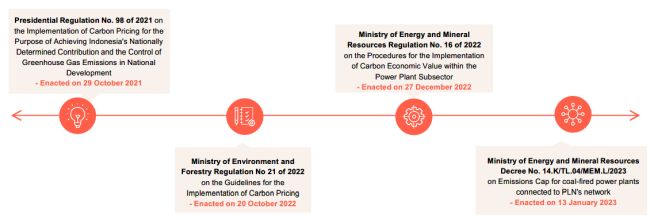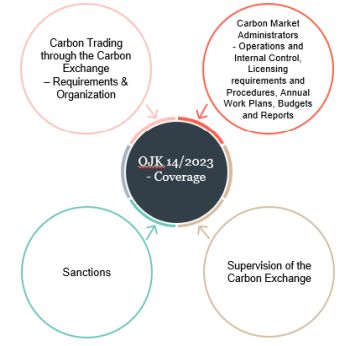Introduction
Over the past two years, the Government of Indonesia (GoI) has gradually been developing a regulatory framework on carbon pricing and trading through Presidential Regulation No. 98 of 2021 on the Implementation of Carbon Pricing (PR 98/2021) and Ministry of Environment and Forestry (MOEF) Regulation No. 21 of 2022 on the Guidelines for the Implementation of Carbon Pricing (MOEF 21/2022). Earlier this year, the GoI also issued Law No. 4 of 2023 on the Development and Strengthening of the Financial Sector (Law 4/2023) which governs, among others issues, the implementation of Indonesia's domestic carbon market.
Law 4/2023 provides that carbon trading through a "carbon exchange" shall be considered a financial transaction in the capital market sector. Accordingly, the Indonesian Financial Services Authority (Otoritas Jasa Keuangan or OJK) has the authority to oversee and supervise Indonesia's domestic carbon market. Pursuant to this mandate, on 2 August 2023 OJK issued Regulation No. 14 of 2023 on Carbon Trading through Carbon Exchange (OJK 14/2023) to further regulate the implementation of Indonesia's carbon market.
This article provides an overview of the key principles and requirements of Indonesia's carbon market as regulated under Law 4/2023 and OJK 14/2023, as well as an update on the possibility to conduct international voluntary carbon trading from Indonesia.
Short Refresher on the Regulatory Framework on Carbon Pricing and Trading

As a refresher, through PR 98/2021 and MOEF 21/2022, the GoI has implemented "cap and trade" and "cap and tax" mechanisms aiming at reducing greenhouse gas (GHG) emissions and achieving its Nationally Determined Contribution (NDC). Through these mechanisms the GoI will progressively introduce mandatory "emission caps" and a carbon tax across certain sectors/businesses to govern emission levels and enable carbon pricing.
One of the instruments within the "cap and trade" mechanism is carbon trading, which pursuant to MOEF 21/2022 can be conducted both domestically and internationally and may take place either through:1
- carbon markets; and/or
- direct trading between business entities.
For further detail, please refer to our earlier articles summarizing the various carbon pricing and trading regulations issued in Indonesia to date:
- Regulatory Overview of Carbon Pricing and Trading in Indonesia
- Indonesia carbon pricing and trading regime for power generation
Key Principles for Carbon Trading in Indonesia's Domestic Carbon Market
The following chart illustrates the coverage of OJK 14/2023.

(a) Carbon units are classified as securities
Pursuant to Law 4/2023, carbon trading is a market-based mechanism to reduce GHG emissions by selling and purchasing carbon units. Law 4/2023 and OJK 14/2023 classify carbon units as securities.2
"Securities" is defined under both Law No. 8 of 1995 on Capital Market as lastly amended by Law 4/2023 (Capital Market Law) and OJK 14/20233 as "securities or investment contracts in conventional and digital form or other forms in accordance with technological developments which give the owner the right to directly or indirectly obtain economic benefits from the issuer or from certain parties based on the agreement and any derivatives of securities, which can be transferred and/or traded on the capital market".
OJK 14/2023 provides that carbon units being transacted in Indonesia's domestic carbon market must first be recorded with:4
- the National Registry System for Climate Change Control (Sistem Registrasi Nasional Pengendalian Perubahan Iklim or SRN PPI), which is a web-based data and information management and provision system on actions and resources for climate change mitigation, climate change adaptation, and carbon economic value in Indonesia managed by the MOEF; and
- a domestic carbon exchange administrator, which is an entity administering and implementing the carbon market which has obtained the relevant license from the OJK.5 Please see point (c) below on further details about the carbon market administrator.
OJK 14/2023 requires carbon units which can be traded in Indonesia's domestic carbon market to be in the form of:6
|
Technical Approval for Emission Ceiling for Business Actors (Persetujuan Teknis Batas Atas Emisi bagi Pelaku Usaha or PTBAE-PU) A stipulation of the ceiling of GHG emission for a business actor and/or a stipulation of emission quota within a specific period for every business actor |
GHG Emission Reduction Certificate (Sertifikat Pengurangan Emisi Gas Rumah Kaca or SPE-GRK) A certificate evidencing emission reduction by a business and/or activity which has been subject to measurement, reporting and verification and has been recorded in the SRN PPI in the form of a registry number and/or code |
(b) International carbon trading in Indonesia's domestic carbon market
Law 4/2023 provides that onshore and/or offshore carbon units may be traded in Indonesia's domestic carbon market when administered and implemented by a "carbon exchange administrator".
The carbon exchange administrator may facilitate the trading of carbon units from other countries regardless of whether the carbon units are recorded in the SRN PPI, provided that such trading does not contradict applicable regulations.7
OJK 14/2023 provides that international carbon trading may be in the form of:
- carbon trading done by foreign parties; and/or
- trading of carbon units issued by other countries or foreign parties.
Foreign carbon units that are not recorded in the SRN PPI must fulfil the following requirements:8
- having been registered, validated and verified by an agency which has obtained accreditation from an international registration system administrator;
- fulfilling the requirements to be traded on a foreign carbon exchange; and
- fulfilling any other requirements stipulated by the OJK upon coordination with the MOEF.
(c) Carbon Exchange
As noted above, Law 4/2023 requires Indonesia's domestic carbon market to be administered and implemented by carbon exchange administrators who have obtained the relevant license from the OJK.
A "market/exchange administrator" is defined under the Capital Market Law as a party who administers and provides systems and/or facilities to bring together parties carrying out transactions on securities or financial instruments in the capital market or an organized financial market.9
OJK 14/2023 provides general guidance on the main requirements, obligations and governance to be fulfilled by carbon exchange administrators including the following:
- the administrator shall be a limited liability company having its legal domicile in Indonesia;10
- the administrator shall have a paid-up capital of at least IDR100 billion (approximately USD 6.5 million)11 which shall not originate from loan(s);12
- the administrator shall organize, provide and utilize electronic system for the carbon trading transactions on a continuous basis, meaning that the trading administration shall be implemented continuously as long as such carbon unit has not been used in the fulfillment of any emission reduction obligation of any businesses;13
- the administrator is prohibited from itself performing trading transactions for its own interest in the system it administers;14
- the administrator shall issue regulations with respect
to:
- the users of its system, including the requirements and procedures to become a user;
- the carbon units being traded in the system, including the criteria and registration procedure for the carbon units as well as the relevant fees;
- the trading activities, including trading procedure, settlement procedure and transaction fees; and
- the supervision of trading activities.
In addition, OJK 14/2023 allows the carbon market administrator to (i) conduct other activities, such as administering trading platform for derivative products of carbon units and (ii) develop products based on carbon units (derivative products), subject to approval from OJK.15
Update on the Possibility to Conduct International Voluntary Carbon Trading
As described above, OJK 14/2023 clearly allows the possibility for foreign parties to trade and for foreign carbon units to be traded in Indonesia's domestic carbon market, subject to certain regulatory requirements.
On the other hand, both Law 4/2023 and OJK 14/2023 do not specify whether carbon units generated in Indonesia may be traded on foreign carbon markets. This is an aspect of the nascent Indonesian carbon pricing and trading market which has raised a lot of questions from businesses
The possibility to trade internationally carbon units which originate from Indonesia is envisaged in PR 98/2021 and MOEF 21/2022 and have been considered in detail in a "position paper" from MOEF which was issued in May 2023.
Pursuant to PR 98/2021, international carbon trading is possible but shall not reduce the achievement of Indonesia's NDC target in 2030.16 MOEF 21/2022 further provides that international carbon trading shall be subject to the following requirements:17
- the relevant sectoral ministries must have determined and submitted to the MOEF a plan and strategy for the achievement of NDC for the respective sectors and subsectors;
- the relevant subsectors or sub-subsectors must have achieved the determined NDC;
- the international trade must obtain a prior approval from the MOEF; and
- the carbon unit needs to be registered in the SRN PPI.
MOEF 21/2022 provides that the MOEF will stipulate a protocol providing further detail and requirements for the implementation of international voluntary carbon trading from Indonesia.18
Certain participants and business interest groups have expressed disagreement with the view that international voluntary trading would affect the fulfilment of Indonesia's NDC and argue that such voluntary trading should therefore not be overly restrained.
It will have to be seen whether the further upcoming regulations and guidelines which are expected to be issued by MOEF and other regulators will provide more clarity and certainty for projects and business participants which are focusing on the voluntary carbon markets, as opposed to the compliance market and trading which will gradually also be developing as new sectoral regulations setting out emissions limits will be enacted.
Conclusion
With the issuance of Law 4/2023 and OJK 14/2023, the GoI is taking one further step in completing the implementation of carbon pricing and trading in Indonesia.
Given that OJK 14/2023 mainly regulates the establishment and requirements for a carbon exchange, further implementing regulation and guidance will be required to lay the ground for the detailed procedures to conduct carbon trading on such carbon exchange. It is anticipated that OJK will shortly issue a circular letter providing additional details on the registration of carbon units and certain requirements applicable to carbon exchanges. Also, when a carbon exchange will have been established and licensed by OJK, it will develop its own regulations (or standard operating procedure – SOP) for the registration and trading of carbon units.
Even though no specific carbon exchange administrator(s) have been designated, the stringent nature of the requirements under OJK 14/2023 may suggest that the Indonesian Stock Exchange (IDX) will ultimately become the initial carbon exchange administrator.
In terms of international carbon trading, OJK 14/2023 allows the possibility for foreign parties to trade and for foreign carbon units to be traded in Indonesia's domestic carbon market. However, there remains uncertainty in relation to the offshore trading of carbon units generated in Indonesia. Even if MOEF has confirmed that this is technically possible, it has also clearly stated that international trading is subject to a number of steps and requirements which are to become increasingly regulated.
It is expected that further implementing regulations will soon be issued to gradually complete the necessary framework to allow for the effective implementation of carbon pricing and trading in and from Indonesia. These include:
- further OJK regulations on the implementation of Indonesia's domestic carbon market, including the procedure to obtain the OJK license and the requirements for foreign carbon units to be traded in Indonesia's domestic carbon market;
- an MOEF regulation on the protocol to implement international voluntary carbon trading; and
- more sectorial ministries regulations on NDC and carbon pricing applicable to relevant sectors.
Footnotes
1. Articles 4-5 of MOEF 21/2022.
2. Article 23 of Law 4/2023 and Article 3(1) of OJK 14/2023.
3. Article 1 point 5 of the Capital Market Law and Article 1 point 6 of OJK 14/2023.
4. Article 3(2) of OJK 14/2023.
5. Article 24 of Law 4/2023.
6. Articles 5 and 1(4) and (5) of OJK 14/2023.
7. Article 3(3) of OJK 14/2023.
8. Article 3(4) and (5) of OJK 14/2023.
9. Article 1 point 31 of the Capital Market Law.
10. Article 11 of OJK 14/2023.
11. Based on the exchange rate as at 4 September 2023.
12. Article 13 of OJK 14/2023.
13. Article 7(2) of OJK 14/2023.
14. Article 9 of OJK 14/2023.
15. Article 6 of OJK 14/2023.
16. Article 49 of PR 98/2021.
17. Article 4(3) of MOEF 21/2022.
18. Article 18(4) of MOEF 21/2022.
Originally published 11 September 2023
The content of this article is intended to provide a general guide to the subject matter. Specialist advice should be sought about your specific circumstances.


